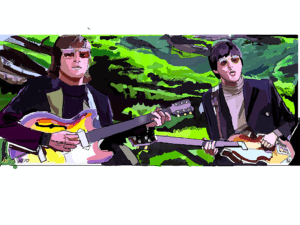Podcast: Play in new window | Download

In which we welcome back to the show historian Erin Torkelson Weber. In this episode, we pick up where we left off; this time discussing older canon works like Ian MacDonald’s Revolution in the Head and Peter Doggett’s You Never Give Me Your Money; (also Peter McCabe’s outdated Apple To The Core and the problematic memoir of Geoff Emerick) as well as new essential works like Riding So High by Joe Gooden. We also talk about how the Beatles’ historic narrative was shaped, countered and re-evaluated as Mark Lewisohn’s works represented a true revolution in Beatles scholarship.
Erin’s previous appearance:
Her blog: https://beatlebioreview.wordpress.com/
Erin in action:


Another wonderful show, Robert!
Erin is such an engaging guest, and I look forward to hearing more from her on a future show.
Keep up the great work; we truly appreciate your efforts.
Pingback: Something About the Beatles: Interview II, The Historian and the Beatles – The Historian and The Beatles
Erin is, hands-down, my favorite guest. You and she have a terrific rapport and the conversation is utterly fascinating. Love it. Please have her on again (and again!)
I was going to say the same thing. Incredible chemistry. I’d dearly love to hear many more episodes like this.
Fully agree! Easily one of the best episodes of this already peerless podcast. More Erin please☺.
Thinly veiled character assassination of Lennon and Erin’s voice is most irritating
And what character assassination would that be, Tommy?
What are you talking about Tommy? Please explain……don’t comment and run…
Superb. You should have her on as often as possible.
Totally agree!
She’s great Robert. Fascinating stuff once again. And so refreshing to hear more about the drug use that has been so censored in the past. The real truth can be discovered by looking more closely at this subject more than any other….the pleasure mixed with paranoia and mis judgement caused by using drugs took them on their amazing journey. Look at the Ron Howard film and how it showed the change noted by Larry Kane who realised he could no longer communicate with them because they were stoned and how this made it even more difficult to enter their circle. Filming Help! in Nassau was the turning point and there was no way back to where they once belonged. Discuss…….
Great show, this is one guest I can’t stop listening to. I do think the second and third installment of Lewisohn’s saga will be one of benchmarks of the history IF of course he lives to complete them!
“Lennon Remembers” was mostly repudiated even by John himself by his death. It was entertaining but quite obvious a lot of self serving ranting and raving occured! And I was a Lennon man for sure but I could see that ,even at the time it came out.
I have read almost every book mentioned they are all somewhat slanted. Thanks for trying to get the most accurate picture.
One book I reccomend not mentioned is “While My Guitar Gently Weeps” the music of George Harrison by Simon Leng. It is however largely a musical analysis of George’s work during and after the Beatles…there is little or no delving into personality or gossip. It covers the brilliance of Harrison’s musical contributions .
Wow! Really enjoyed the demo of I’m So Tired. I hadn’t heard that before.
Interesting that there was an effort to downplay the impact of Revolution in the Head, mainly because McDonald wasn’t overly effusive about Harrison & what happened in McDonald’s personal life. In my opinion, Revolution in the Head remains to this day one of the most essential pieces of Beatles writing. Of prime importance is the fact he clearly analyses the Lennon &McCartney song writing battles & how LSD almost destroyed Lennon as a person & a writer.
I re-read what he said on Harrison. I thought most of it rung true. He gave great praise to Long,Long,Long, which I believe is a masterpiece but was largely dismissive of Blue Jay Way and pre-1966 material. Fair enough. He gave great praise to Something as well.
Erudite, intelligent, informative, interesting…and that was just you Robert! Erin was and is superb – more of her please!
Thanks both for this really insightful and wide-ranging analysis of works written about the Beatles’ lives, music, impact etc.
One thing that struck me is the discussion around the impact that LSD had in softening and altering John’s personality.
If we accept this position, is there a secondary question around whether LSD was responsible for enacting that change, or did it merely amplify an already turbulent personality? For example the effects of his parents’ fractured relationship and his mother’s death, the anxiety and guilt caused by his unhappy marriage to Cynthia, the disorienting effects of fame and immense pressure built up during Beatlemania.
Actually I wonder whether the impulse within John and Paul during the mid-60s to both write about their childhoods was not only a result of acid introspection, but also a need to ground themselves and provide some emotional security throughout the turmoil of that period.
Anyways…
she was fascinating an it was a great interview! Thank you, but I have to go back to the first podcast with your guest pronto
Slight correction: Imperial Bedroom was 1982 not 1983